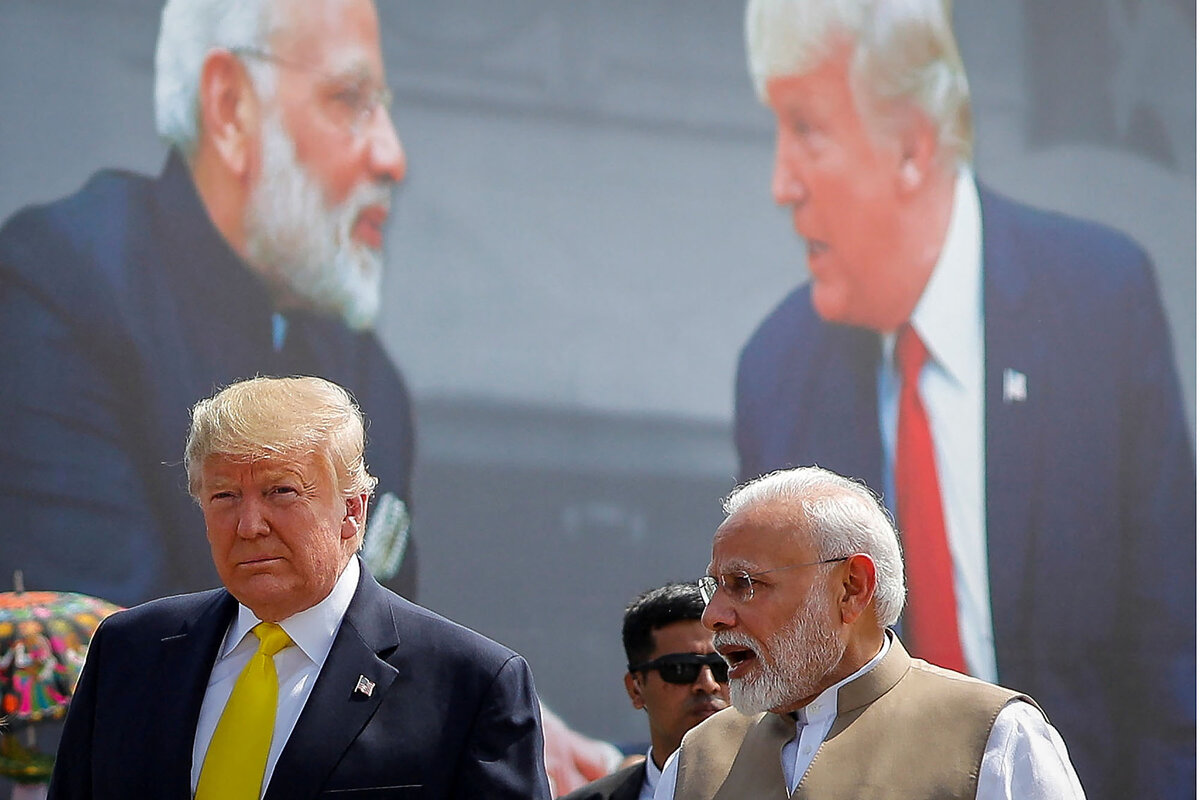Is the West’s liberal template broken?
Loading...
| London
One day in the not too distant future, we may look back on Donald Trump’s return to power as the death knell of “liberal internationalism.” The belief that the world’s brightest future lay in a marriage of free countries, free societies, free markets, and free trade might turn out to be an idea whose time has passed.
Not just maybe. As things now stand, it’s very probable. And the stakes are high, not just for world trade but also for representative government in major democracies.
Whether we have indeed witnessed liberal internationalism’s last rites will ultimately depend on one question: whether its champions in those democracies are able to make a new and compelling case to increasingly skeptical electorates that it serves their interests.
Why We Wrote This
Around the world, citizens are losing faith in the liberal international order, citing its failure to make them feel safer or better off. Does Donald Trump’s inauguration mark the end of the 80-year-old Western project?
For now, that’s looking like a steep challenge.
President Trump has returned to lead the United States, still the world’s richest and most powerful country, with a starkly different vision. He is offering a can-do, strongman brand of rule; impatience with checks and balances on his power; a preference for tariffs over free trade; and the unilateral exercise of power abroad in the exclusive service of American interests.
And there are signs his approach is resonating in other Western democracies, where more voters are asking themselves, “Why does free trade matter – why does democracy matter – if neither is making me or my family feel more secure or more prosperous?”
President Trump’s approach has also resonated among the leaders of developing nations in the Global South.
First, it promises to free them from U.S. pressure on issues like workers’ rights, minority rights, human rights, and democratic governance. It also reduces their relationship with Washington to a transactional business, in which each side simply pursues its interests and looks for win-win deals.
All of this paints a daunting landscape for those hoping that some form of the old international vision can be rescued and revived.
Those holdouts know that their success will depend on a broader understanding of both why liberal internationalism took root and thrived for so long, and why it now appears to be collapsing.
The seeds of a shared vision of vigorous democracy, innovative economies, and free trade were planted after World War II, when America used its power to foster democratic government, economic cooperation, trade, and growth in the war-ravaged countries of Western Europe.
The vision gathered strength during the Cold War, when Washington and its market-economy allies worldwide made common cause against Moscow and its Communist comrades.
But liberal internationalism really got into gear in the 1990s. The Cold War was over; the Soviet Union disbanded and its allies looked Westward; and the world’s other Communist power, China, opened its economy to the world.
To many, it seemed self-evident that the arc of history would inexorably bend away from autocracy, closed societies, and state-run economies in favor of greater political and economic freedom, and that the economic benefits would reduce international tension and conflicts.
And that vision did deliver: global trade, standards of living, levels of health, and education all rose, while world poverty fell.
But then came complications.
The bulk of the benefits were flowing to China, which became the low-cost producer for the developed world, and to consumers in advanced economies whose shops offered a cornucopia of cheaper goods.
Also benefiting were the businesses, banks, and investment funds priming the machine.
Yet China’s increasingly powerful economy started doing more than produce cheap exports. It siphoned off jobs. And it was not simply a new market for Western businesses. It weakened some and – assisted by generous Chinese government subsidies – outcompeted others.
Then came a triple blow: the worldwide market crash in 2007, the COVID-19 pandemic, and the economic fallout from Russia’s 2022 invasion of Ukraine.
The combined effect has been to dampen economic growth and boost the cost of living worldwide.
It has also highlighted the divide between those who have benefited and those who lost out, especially in the developed world. Bankers and big-business executives weathered the storm just fine. The rest, not so much.
It is that sense of injustice that has been broadening support not only for Mr. Trump, but also for populist-nationalist politicians in other countries, including longtime U.S. partners in Europe.
A flurry of international polls and studies, including an annual survey by the widely respected Pew Research Center, have found growing discontent with the way in which democratic governments are working, particularly in the economic sphere.
And while that doesn’t necessarily mean voters outside America will opt for leaders in Mr. Trump’s mold, it does suggest that defenders of liberal internationalism are under pressure to demonstrate that their approach can make voters’ everyday lives better.
Underscoring the scale of that challenge, a new survey this week found an especially impatient mood in Britain, where 1 in 7 respondents – 1 in 5 among those under 45 – endorsed the following proposition: That “the best system for running a country effectively is a strong leader who doesn’t have to bother with elections.”







